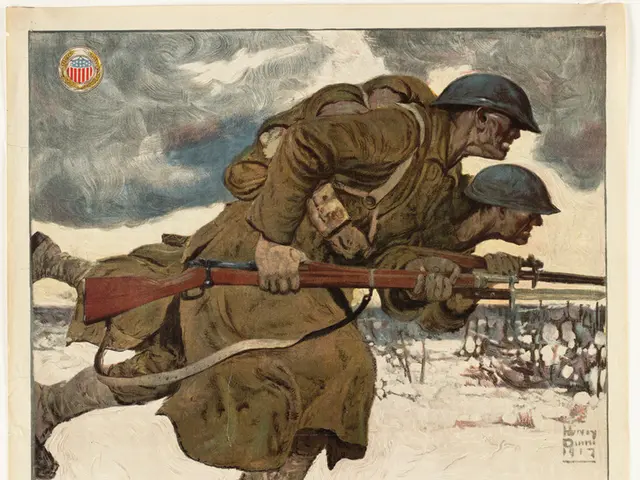Vice President JD Vance Speaks Out on Russian War Requirements
Russia Demands Excessive Concessions, According to Vance; Trump Urges Swift Decision-Making
Vice President JD Vance took a firm stance during a recent meeting, asserting that the Russians are "greedily seeking an excessive amount" in terms of war-ending conditions and proposing that direct negotiation between Russia and Ukraine is crucial.
During the Munich Leaders Meeting in Washington, D.C., Vance stated, "I don't believe the Russians are disinterested in wrapping this up, but they're asking for an extensive list of demands and concessions to end the conflict. And we think they're asking for way too much."
Reacting to Vance's comments, President Donald Trump, seeming unaware of the discussion, responded, "Well, it's plausible that he knows some things... because I've been dealing with this and other matters."
The President further iterated the administration's warning that negotiations without progress are nearing their limits, adding, "We're reaching a point where tough choices will need to be made. I'm not happy about it."
Vance elaborated that the Trump administration has moved beyond the US-proposed 30-day ceasefire, as Russia has declared it "not in our strategic interest."
"What the Russians have said—though you don't have to agree with it—is essential in understanding where they're coming from. A 30-day ceasefire is not in our strategic interest," Vance explained. "We've shifted our focus from the obsession with the 30-day ceasefire to discussing the long-term settlement and have been progressing."
Addressing the heart of the matter, Vance emphasized the necessity of direct talks between Russia and Ukraine, stating, "We want both Russia and Ukraine to agree on basic guidelines for sitting down and communicating. The United States is certainly willing to participate in those conversations, but it's imperative for the Russians and Ukrainians to begin dialoguing."
Vance underscored, "We think it's impossible to mediate this entirely without at least some direct negotiation between the two."
Despite his pessimism about the ongoing conflict, Vance conveyed his optimism on finding a resolution, stating, "We believe that the continued conflict is detrimental to us, Europe, Russia, and Ukraine. If we can preserve peace, it will be economically beneficial for both Ukrainians and Russians, most importantly, saving lives."
The day prior, the administration's envoy for Ukraine and Russia voiced concern over President Putin's refusal to agree to the 30-day truce, labeling it the main "hindrance" to peace talks. This obstacle, however, might be circumvented as Ukraine has shown willingness to create a demilitarized zone within its territory as part of a potential ceasefire agreement [ES].
Vance and Europe: A Shared Front
Vance's statements at the gathering arrived several months after his fiery speech in Germany, where he criticized European leaders for ignoring shared values, such as freedom of speech, and underestimating threats from Russia.
While this speech was not the primary topic of discussion during Wednesday's meeting, it was not disregarded entirely. Wolfgang Ischinger, the former chairman of the conference and now president of the MSC Foundation Council, acknowledged the brochure the group published about Vance's remarks and the global reaction to it, which, in his words, "triggered a contentious debate about fundamental values that we have never witnessed at the Munich Security Conference."
Nonetheless, Vance struck a conciliatory tone, stating, "I believe that European civilization and American civilization, European culture and American culture, are closely linked, and they will remain so. It's complete nonsense to think you can drive a firm wedge between the United States and Europe."
Reiterating his and the President's position on European defense spending, Vance asserted that discussions concerning security posture and "big questions" should be reevaluated together.
In closing remarks following the Q&A session, Vance humorously alluded to the controversy surrounding his previous speech, attempting to smooth things over. "I appreciate your kind words, and I appreciate the invitation back. I wasn't sure after February whether I'd get the invitation back," he said. Ischinger chipped in, "Well, we did consider it…"
The collaborative work of Ivana Kottasová, Kostya Gak, and Victoria Butenko went into this report.
Note:[ES] Enrichment Data
Current Proposed Requirements for Ending the War
Ukraine’s Position- Ceasefire Prioritized: The Ukrainian government insists that peace talks can only commence after a full ceasefire is established on the ground.- Conditional Negotiations: Ukraine is open to unconditional ceasefire proposals yet refuses to negotiate while hostilities continue, demanding that Russian forces halt all attacks before substantive discussions can start.
Russia’s Position- No Immediate Ceasefire: As of now, Russia has not agreed to an unconditional ceasefire, instead continuing and even escalating its military operations across Ukraine.- Peace Proposals: Russia has either stalled or rejected various peace proposals, including ceasefire suggestions and partial truces.
U.S. and Western Proposals- Ceasefire and Partial Truce: The U.S. has recently pushed for a 30-day ceasefire and partial truces to halt attacks on civilian infrastructure.- Territorial Compromise: U.S.-proposed frameworks include recognition of Russian control over Crimea and at least tacit acceptance of Russian occupation in parts of eastern Ukraine (Donbas), which Ukraine has resisted.- No NATO Membership for Ukraine: The U.S. under the current administration has indicated it does not support Ukrainian NATO membership and will not deploy U.S. troops to enforce any peace agreement, leaving security largely to Ukraine and its European partners.
Views of the US and Europe on Direct Negotiation
United States- Scaling Back Mediation: The U.S. has signaled a shift toward a less direct role in peace talks, indicating frustration with both parties’ inflexibility. U.S. officials have stated that the onus is now on Russia and Ukraine to negotiate directly, as each side’s terms for peace are now clear.- Frustration: Recent comments from U.S. leaders, including Vice President JD Vance, reflect a sentiment that the war is unlikely to end soon and that direct negotiation between the two parties is necessary for any real progress.- Focus on Diplomacy: Despite frustration, the U.S. remains involved in diplomatic efforts, including behind-the-scenes talks and multilateral meetings, though high-level officials have at times avoided direct participation in peace summits.
Europe- Skepticism Toward Russian Intentions: European officials remain deeply skeptical of Russian President Putin’s willingness to make genuine concessions or adhere to a peace agreement.- Support for Ukraine: Europe supports Ukraine’s right to negotiate from a position of strength and is concerned about being sidelined as the U.S. and Russia engage in bilateral talks. However, there is recognition that any lasting peace will require difficult compromises, possibly including some form of territorial concession.- Desire for Multilateral Involvement: Europeans stress the importance of inclusive negotiation frameworks that include Ukraine, rather than deals brokered solely between the U.S. and Russia.
Summary Table: Key Proposals and Positions
| Party | Ceasefire Condition | Territorial Concessions | NATO Membership | Direct Negotiation Support ||--------------|---------------------|------------------------|-----------------|---------------------------|| Ukraine | Full ceasefire first| Opposed | Aspires, US opposed | Only after ceasefire || Russia | No commitment | Demanded (Crimea, Donbas) | Opposed | On own terms || U.S.A. | 30-day ceasefire | Some acceptance proposed | Opposed | Increasingly hands-off || Europe | Varies | Reluctant, but pragmatic | Supportive | Inclusive, multilateral |
The current stalemate is shaped by Ukraine’s demand for a full ceasefire before talks, Russia’s refusal to cease hostilities or relinquish occupied territory, and the U.S./Europe’s mix of diplomatic engagement, skepticism, and calls for direct negotiation between the warring parties.
- Vice President JD Vance speaks about the necessity of direct negotiations between Russia and Ukraine, stating that such dialogues are essential for understanding each party's position in the conflict.
- In his statement, Vance elaborates on the Trump administration's pivot from focusing on a 30-day ceasefire to instead discussing long-term settlements, indicating progress in the peace talks.
- In the Munich Leaders Meeting, Vance also touched upon the importance of shared values between the United States and Europe, emphasizing the strong bond between the two civilizations.
- Though Russia has not agreed to an unconditional ceasefire, as per Vance, the United States is now scaling back its mediatory role, placing the responsibility for direct negotiations squarely on Russia and Ukraine.
- In light of the ongoing crime-and-justice issues, sports-betting regulations are receiving more attention in policy-and-legislation discussions, as they may indirectly impact war-and-conflicts resolutions.
- The general-news landscape is closely watching the developing story between Russia, Ukraine, and the United States, with sports stories taking a backseat amidst this international crisis.










